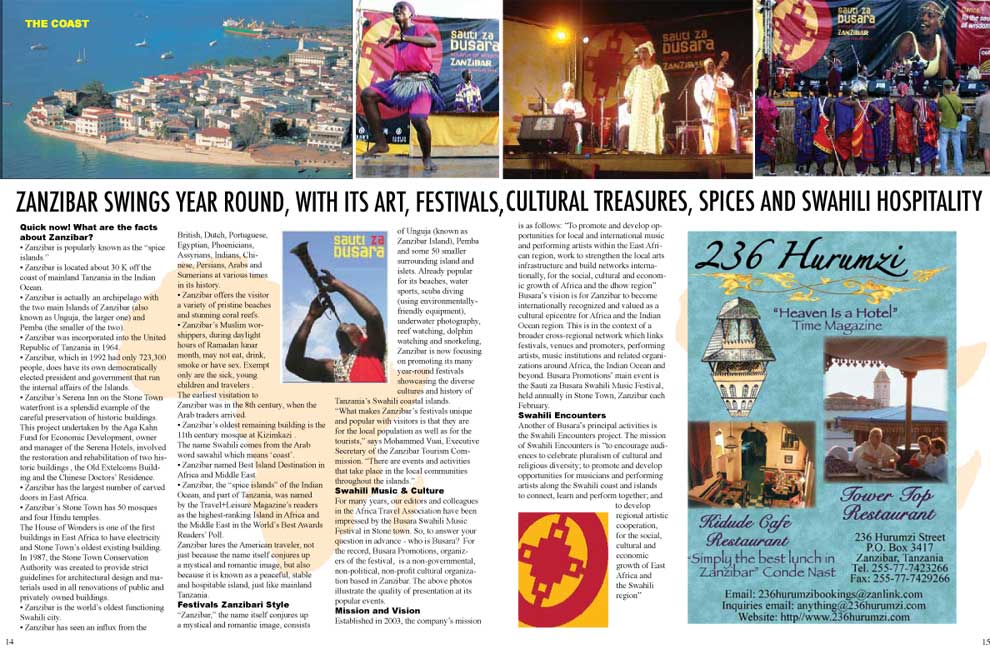
ZANZIBAR
FESTIVAL TOURS GLOBAL TOLL FREE: +
800-8186-8770Please note: the " + " sign indicates
local international prefix numbers that have to be
dialed PRIOR to the 800 number and these vary somewhat
from country to country. For your convenience in
reaching us quickly and directly by telephone, we
offer you these current prefixes by
country: U.K. 00 GERMANY 00
FRANCE 00 ITALY 00 SPAIN 00 NORWAY 00 / SWEDEN 00
DENMARK 00 SWITZERLAND 00 IRELAND 00 JAPAN 010 AUSTRALIA
0011 NEW ZEALAND 00 HONG KONG 001 / SINGAPORE 001
CHINA 00 TAIWAN 002 KENYA/TANZANIA 000 Email us:
info@zanzibarfestivaltours.com R ZANZIBAR www.busaramusic.org TANZANIA AFRICA Quick now! What are the facts
about Zanzibar? • Zanzibar is popularly
known as the "spice islands." • Zanzibar is located about
30 K off the coast of mainland Tanzania in the Indian
Ocean. • Zanzibar is actually an
archipelago with the two main Islands of Zanzibar
(also known as Unguja, the larger one) and Pemba (the
smaller of the two). • Zanzibar was incorporated
into the United Republic of Tanzania in
1964. • Zanzibar, which in 1992
had only 723,300 people, does have its own
democratically elected president and government that
run the internal affairs of the Islands. • Zanzibar's Serena Inn on
the Stone Town waterfront is a splendid example of the
careful preservation of historic buildings. This
project undertaken by the Aga Kahn Fund for Economic
Development, owner and manager of the Serena Hotels,
involved the restoration and rehabilitation of two
historic buildings , the Old Extelcoms Building and
the Chinese Doctors' Residence. • Zanzibar has the largest
number of carved doors in East Africa. • Zanzibar's Stone Town has
50 mosques and four Hindu temples. The House of Wonders is one of
the first buildings in East Africa to have electricity
and Stone Town's oldest existing building. In 1987, the Stone Town
Conservation Authority was created to provide strict
guidelines for architectural design and materials used
in all renovations of public and privately owned
buildings. • Zanzibar is the world's
oldest functioning Swahili city. • Zanzibar has seen an
influx from the British, Dutch, Portuguese, Egyptian,
Phoenicians, Assyrians, Indians, Chinese, Persians,
Arabs and Sumerians at various times in its
history. • Zanzibar offers the
visitor a variety of pristine beaches and stunning
coral reefs. • Zanzibar's Muslim
worshippers, during daylight hours of Ramadan lunar
month, may not eat, drink, smoke or have sex. Exempt
only are the sick, young children and travelers
. The earliest visitation to
Zanzibar was in the 8th century, when the Arab traders
arrived. • Zanzibar's oldest
remaining building is the 11th century mosque at
Kizimkazi . The name Swahili comes from the
Arab word sawahil which means 'coast'. • Zanzibar named Best
Island Destination in Africa and Middle
East • Zanzibar, the "spice
islands" of the Indian Ocean, and part of Tanzania,
was named by the Travel+Leisure Magazine's readers as
the highest-ranking Island in Africa and the Middle
East in the World's Best Awards Readers' Poll.
Zanzibar lures the American traveler, not just
because the name itself conjures up a mystical and
romantic image, but also because it is known as a
peaceful, stable and hospitable island, just like
mainland Tanzania Festivals Zanzibari
Style "Zanzibar," the name itself
conjures up a mystical and romantic image, consists of
Unguja (known as Zanzibar Island), Pemba and some 50
smaller surrounding island and islets. Already popular
for its beaches, water sports, scuba diving (using
environmentally-friendly equipment), underwater
photography, reef watching, dolphin watching and
snorkeling, Zanzibar is now focusing on promoting its
many year-round festivals showcasing the diverse
cultures and history of Tanzania's Swahili coastal
islands. "What makes Zanzibar's festivals
unique and popular with visitors is that they are for
the local population as well as for the tourists,"
says Mohammed Vuai, Executive Secretary of the
Zanzibar Tourism Commission. "There are events and
activities that take place in the local communities
throughout the islands." Swahili Music & Culture For
many years, our editors and colleagues in the Africa
Travel Association have been impressed by the Busara
Swahili Music Festival in Stone town. So, to answer
your question in advance - who is Busara? For the
record, Busara Promotions, organizers of the festival,
is a non-governmental, non-political, non-profit
cultural organization based in Zanzibar. The above
photos illustrate the quality of presentation at its
popular events. Mission and Vision Established in 2003, the
company's mission is as follows: "To promote and
develop opportunities for local and international
music and performing artists within the East African
region, work to strengthen the local arts
infrastructure and build networks internationally, for
the social, cultural and economic growth of Africa and
the dhow region" Busara's vision is for Zanzibar to
become internationally recognized and valued as a
cultural epicentre for Africa and the Indian Ocean
region. This is in the context of a broader
cross-regional network which links festivals, venues
and promoters, performing artists, music institutions
and related organizations around Africa, the Indian
Ocean and beyond. Busara Promotions' main event is the
Sauti za Busara Swahili Music Festival, held annually
in Stone Town, Zanzibar each February. Swahili EncountersAnother of
Busara's principal activities is the Swahili
Encounters project. The mission of Swahili Encounters
is "to encourage audiences to celebrate pluralism of
cultural and religious diversity; to promote and
develop opportunities for musicians and performing
artists along the Swahili coast and islands to
connect, learn and perform together; and to develop
regional artistic cooperation, for the social,
cultural and economic growth of East Africa and the
Swahili region"
......Preview
fom Best of Africa Edition. Scroll or
click here
for Zanzibar Festival Tours.

CALL TOLL FREE
(U.S. & CANADA): 877-818-6877 ECOMMENDED
LINKS
ECOMMENDED
LINKS
www.ziff.or.tz
www.fotograferen.net
www.africa-ata.org
www.fairmont.com
www.236hurumzi.com
www.tanzaniatouristboard.com
www.tanzaniaparks.com
www.serengeti.org
www.africa-ata.org/mag/.htm
www.africatravelassociation.org
www.goafrica.about.com
www.afropop.org
www.nationalgeographic.com
.